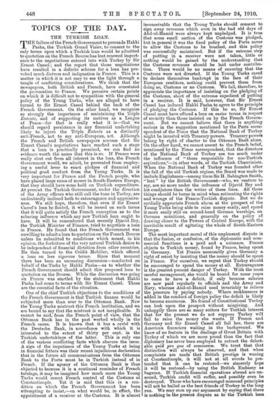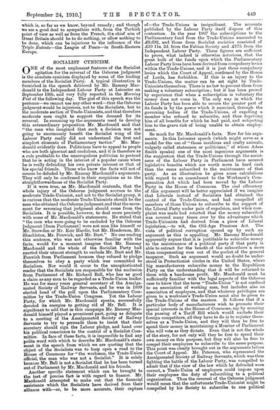TOPICS OF THE DAY.
THE TURKISH LOAN.
THE failure of the French Government to persuade Hakki Pasha, the Turkish Grand Vizier, to consent to the only terms upon which a Turkish loan would be admitted to quotation on the French Bourse has lent renewed import- ance to the negotiations entered into with Turkey by Sir Ernest Cassel ; and the report that those negotiations have resulted in a definite scheme for a loan has pro- voked much distress and indignation in France. This is a matter in which it is not easy to see the light through a tangle of conflicting considerations. We think that the newspapers, both British and French, have overstated the provocation to France. We perceive certain points on which it is difficult not to sympathise with the general policy of the Young Turks, who are alleged to have turned to Sir Ernest Cassel behind the back of the French Government. On the other hand, we recognise so strongly the importance of maintaining the Triple Entente, and of supporting its motives as a League of Peace—for that is really what it is—that we should regard persistence in any financial undertaking likely to injure the Triple Entente as a distinctly anti-French, not to say anti-European, act. Although the French and British newspapers assume that Sir Ernest Cassel's negotiations have reached such a stage that a loan is practically promised, we can find no evidence worth the name that this is so. If France were really shut out from all interest in the loan, the French Government would, we admit, be prevented from employ- ing a useful lever to exact pledges of financial and political good conduct from the Young Turks. It is very important for France and the French people, who have placed large sums of money in South-Eastern Europe, that they should have some hold on Turkish expenditure. At present the Turkish Government, under the direction of the Army officers who still call the tune in Turkey, are undoubtedly inclined both to extravagance and aggressive- ness. We still hope, therefore, that even if Sir Ernest Cassel's loan be floated, it will be issued on such terms that it will quite satisfy the French conception as to the sobering influence which any new Turkish loan ought to have. It will be remembered that recently Djavid Bey, the Turkish Minister of Finance, tried to negotiate a loan in France. He found that the French Government was unwilling to admit a loan to quotation on the French Bourse unless he submitted to conditions which meant, in his opinion, the forfeiture of the very natural Turkish desire to be independent of financial dictation from other countries. He then turned to the Credit Mobilier, which offered a loan on less rigorous terms. Since that moment there has been an unceasing discussion—conducted on behalf of the Turks by Hakki Pasha—as to whether the French Government should admit this proposed loan to quotation on the Bourse. While the discussion was going on France was startled by the statement that Hakki Pasha had come to terms with Sir Ernest Cassel. Those are the essential facts of the situation.
One of the chief Turkish objections to the conditions of the French Government is that Turkish finance would be subjected more than ever to the Ottoman Bank. Now the Young Turks mistrust this French institution, and we are bound to say that the mistrust is not inexplicable. It cannot be said, from the French point of view, that the Ottoman Bank has in the past worked wholly in the French cause. It is known that it has a cartel with the Deutsche Bank, in accordance with which it is interested to the extent of thirty per cent, in the Turkish undertakings of the latter. This is only one of the various conflicting facts which obscure the issue. A sign of the impatience of the Young Turks at being in financial fetters was their recent injudicious declaration that in the future all communications from the Ottoman Bank to the Porte must be in Turkish instead of in French. If the agency of the Ottoman Bank is thus objected to because it is a continual reminder of French tutelage, it may be imagined how much more the Young Turks would resent French control of the Customs at Constantinople. Yet it is said that this is a con- dition on which the French Government has been attempting to insist,—on what would be, in effect, the appointment of a receiver at the Customs. It is almost inconceivable that the Young Turks should consent to sign away revenues which even in the bad old days of Abd-ul-Hamid were always kept unpled.ged. It is true that some small section of the Customs was pledged, but in general it was the fixed policy of the Porte never to allow the Customs to be touched, and this policy was successfully maintained. But if the extreme step of putting in a receiver were not taken, little or nothing would be gained by the understanding that the Customs revenues should be laid under contribu- tion. There would. be no means of ensuring that the Customs were not diverted. If the Young Turks cared to declare themselves bankrupt in the face of their European creditors, nothing could prevent them from doing so, Customs or no Customs. We fail, therefore, to appreciate the importance of insisting on the pledging of the Customs, short of the extreme expedient of putting in a receiver. It is said, however, that Sir Ernest Cassel has induced Hakki Pasha to agree to the principle of pledging the Customs. If this be so, Sir Ernest Cassel must have offered a loan on easier terms in respect of security than those insisted on by the French Govern- ment. But we cannot believe that there is anything serious in the suggestion mentioned by the Paris corre- spondent of the Times that the National Bank of Turkey might be invested with Treasury powers. Treasury powers belong by right of charter to the Ottoman Bank alone. On the other hand, we cannot assent to the French belief, mentioned by the Times correspondent, that the directors of the National Bank of Turkey are too much under the influence of " those responsible for neo-Turkish aspirations,"—in other words, of the Turkish Chauvinists. When the National Bank of Turkey was founded after the fall of the old Turkish regime, the Board was made to include Englishmen—among them Sir H. Babington Smith, " lent " by the British Government—who, we venture to say, are no more under the influence of Djavid Bey and his coadjutors than the writer of these lines. All these things should be borne in mind when estimating the rights and wrongs of the Franco-Turkish dispute. But we do cordially appreciate French alarm at the prospect of the Young Turks being able to raise money easily, and spend it more easily still on second-hand German warships, on German munitions, and generally on the policy of drawing closer to the Powers of Central Europe, with the inevitable result of agitating the whole of South-Eastern Europe. The most important moral of this unpleasant dispute is that the fusion, or confusion, of the diplomatic and com- mercial functions is a. peril and a nuisance. France objects to Turkish money, found by France, being spent in Germany. Yet France necessarily gives Germany a right of retort by insisting that the money should be spent in France. For ourselves, we regret that Turkey should be encouraged to spend the money at all. Extravagance is the greatest present danger of Turkey. With the most careful management, she would be bound for some years to come to have a deficit, if only because salaries are now paid regularly to officials and the Army and Navy, whereas Abd-ul-Hamid used invariably to relieve the pressure by paying nobody. Where recklessness is added in the conduct of foreign policy the deficit is likely to become enormous. No friend of Constitutional Turkey can look upon the prospect without misgiving. And unhappily there are so many suitors for Turkish interest that for the present we do not suppose Turkey will fail to raise the money she wants. If France and Germany and Sir Ernest Cassel all fail her, there are American financiers waiting in the background. We know of no feature in the dealings of Great Britain with Turkey of which we are more proud than the fact that diplomacy has never been employed to extract the delect- able quid pro quo of commerce. We trust that that distinction will always be observed, and that when complaints are made that British prestige is waning at Constantinople, it will not at all events be pre- tended that it can be restored—we sincerely hope it will be restored—by using the British Embassy as bagman. If Turkish financial operations abroad are un- sound, Turkish credit will suffer, and possibly even be destroyed. Those who have encouraged unsound principles will not be hailed as the best friends of Turkey in the long run. We may sum up our argument by saying that there is nothing in the present dispute as to the Turkish loan which is, so far as we know, beyond remedy ; and though we see a good deal to sympathise with, from the Turkish point of view as well as from the French, the chief aim of Great Britain should be to do nothing, or allow nothing to be done, which can be injurious to the influence of the .Triple Entente—the League of Peace—in South-Eastern Europe.











































 Previous page
Previous page